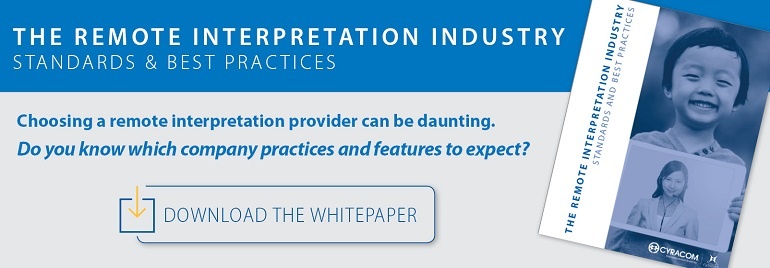
Working in healthcare generally requires education, certification, and vetting to ensure trustworthiness. The reason is obvious: providing healthcare means dealing with vulnerable people in high-stakes scenarios, as well as interacting with their private information. So it makes sense to hold your phone and video interpretation provider—and their interpreters—to those same high standards.
In our new whitepaper, The Remote Interpretation Industry: Standards and Best Practices, CyraCom explores quality metrics for language services providers, including interpreter qualifications and vetting:
Standard: Interpreter Qualifications and Vetting
Purchasers should ask what kind of in-depth vetting process the providers follow to ensure they are hiring quality interpreters. This may include:
Language Proficiency Testing for Potential Interpreters
Are interpreters required to pass a language assessment before beginning work with the provider? What topics does the interpretation provider test on? Is the provider specific or vague when sharing this information?
Interpreter Localization Designed to Maximize Call Quality and Reliability
Where are the majority of your calls going? For the interpreters taking the majority of the provider’s call volume, where are they located? Do they work from a contact center or another office? If not, do they have access to a reliable phone line and a quiet, secure workspace?
Comprehensive Interpreter Training
According to the 2018 Language Services Market, nearly 60% of language service providers have only 2 to 5 full-time employees. 85% of global language service providers have 20 or fewer employees, and less than 3% employ more than 100.
Most companies primarily rely on independent contractor interpreters, even though currently in the US, interpretation providers cannot lawfully train independent contractors.
As a result, interpretation providers with operations in the US must employ interpreters in order to train and certify them. Other options for training or certification do exist--such as language institutions, colleges, and for-profit interpreting training agencies--but the length, difficulty level, and subjects taught are not universally standardized.
A Word on Interpreter Certification
Tremendous progress has been made over the last two decades to develop a national interpretation certification. Two organizations have released their own separate certification for healthcare interpreters: The National Board of Certification of Medical Interpreters (NBCMI) first released its national certification in December 2009, and the Certification Commission for Healthcare Interpreters (CCHI) launched its certification program in early 2011. NBCMI and CCHI currently offer certification for seven languages between the two of them, with more likely becoming available in the future.
Some providers may claim that while they do not train their independent contractor interpreters, that they will only use nationally certified interpreters to take calls. If your language needs exceed the seven languages currently offered for national certification, then providers need to explain what else they do to vet their interpreters for quality.
Background Checks to Confirm Interpreter Trustworthiness
Whenever permissible, providers should conduct background checks on prospective interpreters to ensure they can reliably be trusted with confidential information while interpreting.
Red Flags
- The interpretation provider lacks a standard procedure for vetting interpreters or is vague about interpreter qualifications
- The provider does not require or provide training
- The provider does not run background checks on interpreters, even where permitted
Download CyraCom’s Industry Standards whitepaper for remote interpretation to learn more about what to look for in a language services provider.



